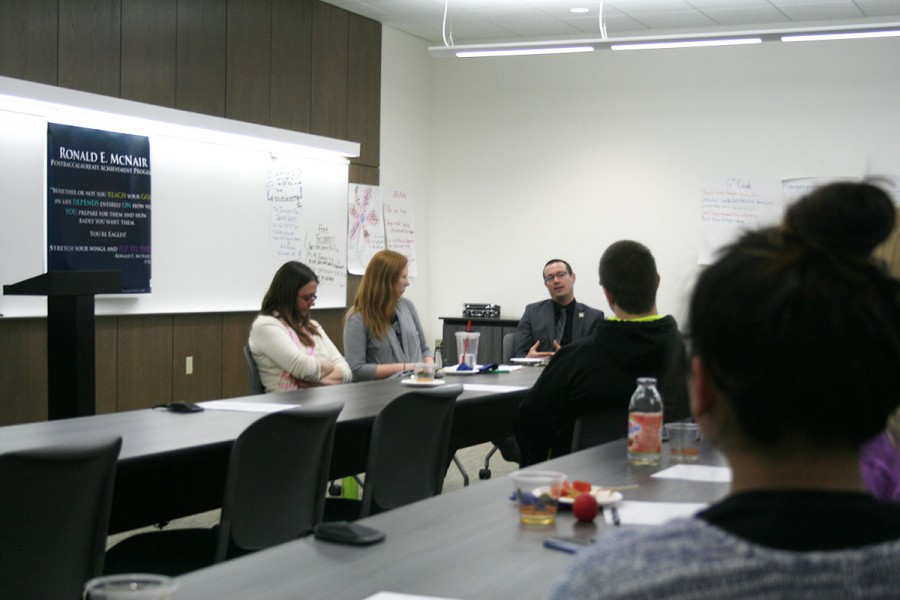Next stop: Graduate school
A panel of McNair alumni shared their experiences overcoming the unique challanges students from disadvantaged backgrounds face pursuing education
More stories from Angel Vang
Photo by Angel Vang
McNair alumni panel discussion held in Centennial. Alumnis’ shared their stories and life experiences with the help of the program to faculty and students.
For students from struggling backgrounds, maybe the greatest challenge is to envision themselves as an innovator, expert or leader of their field when they’ve never experienced that level of success for themselves.
On April 26, three professors set aside a day to give back and bring that vision to life for others who have struggled just as they had.
The McNair program held an alumni panel discussion Tuesday on campus that brought together three doctoral degree holders to one setting to share their stories and life experiences during undergraduate and graduate school to faculty, future McNair scholars and students who were interested in learning more.
Graduate school involves invested time in preparing, working with mentors and learning how to sell one’s research. UW-Eau Claire’s TRIO Ronald E. McNair Postbaccalaureate Achievement Program is a program that will offer these benefits and resources for college students.
The McNair program is named to honor the African-American astronaut Dr. Ronald McNair. The purpose of the program is to level the playing field in graduate level education. It provides disadvantaged college students with effective preparation for research based doctoral study, according to the McNair program brochure.
The panelists were Dr. Carolyn Otto, assistant professor of mathematics at Eau Claire; Dr. Jimmy Gosse, microbiologist for the Agricultural Utilization Research Institute and Dr. Wendy Makoons Geniusz, associate professor of languages at Eau Claire.
Dr. Sanjukta Chaudhuri, director of the McNair program, said freshmen transitioning from high school to college, or even college students, may not be aware that a program like McNair exists and can help prepare them for graduate programs. This panel will help create that visibility to show that it is possible.
During the panel, students asked questions revolving around the alumni’s experiences prior to and during graduate school.
Panelists shared challenges and rewarding experiences, the skills they obtained, regrets they had, passions and how to cope with stress in graduate school.
Within their shared experiences, the panelists offered advice for graduate school, such as learning how to sell your research, the importance of networking and creating a support system.
Dr. Geniusz said she is interested in studying endangered and indigenous languages, such as Ojibwe and is happy when she is surrounded by native people who are interested in language. She said she did not expect the McNair program to help her thus far, especially with her networking. She encourages students to finish college and go to graduate school, and do what they love.
“I love what I do, and I took on more (in graduate school),” Geniusz said. “I immersed in what I wanted to do, and I was really happy because it was exciting.”
Clorice Reinhardt, a junior and biochemistry student, is a current McNair scholar who is interested in learning where the alumnis are now after being involved in the McNair program and where they are heading next with their career. She hopes to pursue a doctorate in Biochemistry and become a professor or mentor and conduct “cool” research.
“I think McNair will help me with networking and finding like-minded others who are interested in the same things I am,” she said.
Carly Goedhart, a junior and chemistry student, is also a current McNair scholar. She is interested in pursuing a doctorate in organic chemistry and research involving cure for cancer, drug development and many other fields of research.
“McNair will help prepare me for graduate school in the long-run,” Goedhart said. “It offers really helpful resources, such as preparing for graduate school and networking.”
Finding a field you’re interested in takes time, Gosse said. Before heading to graduate school he said he learned this after following a pretty girl to UW-Stout who was pursuing her graphics design studies. He realized he can’t draw and hated charcoal. After that he began to work with the organic chemistry department.
“Take your time. You have time for decisions. You have time to talk to a family member, spouse or cat about a decision you’re going to make,” he said. “Maybe it’s not going to be a different decision made, but it allows you to come to a decision.”
With the McNair program, Dr. Otto wants the students to be inspired, courageous, rejuvenated and excited about graduate school.
“Keep up with it. You’re in college for a reason. Have confidence to get done. Be proud. We’re here to show that McNair cares about the students and are invested to help them,” Dr. Otto said.
Dr. Otto said this program created a support system and network for her, which helped her find other compatible disciplines. It also strengthened her confidence because she struggled before and during graduate school when she doubted she could get a degree.
“The McNair program exists (and holds these alumni discussion panels) to show that McNair cares about students and their future transitioning to graduate school,” she said, “and will take time to invest in that.”


